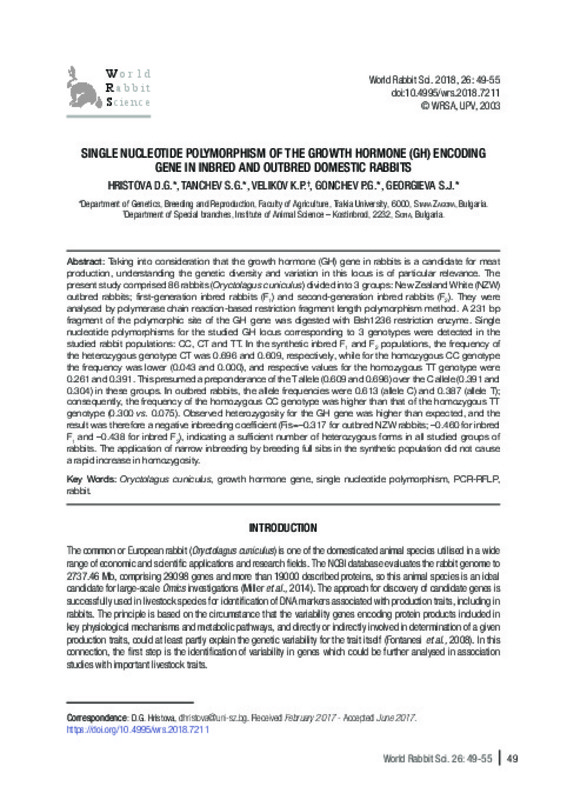JavaScript is disabled for your browser. Some features of this site may not work without it.
Buscar en RiuNet
Listar
Mi cuenta
Estadísticas
Ayuda RiuNet
Admin. UPV
Single nucleotide polymorphism of the growth hormone (GH) encoding gene in inbred and outbred domestic rabbits
Mostrar el registro sencillo del ítem
Ficheros en el ítem
| dc.contributor.author | Hristova, Deyana Gencheva
|
es_ES |
| dc.contributor.author | Tanchev, S.G.
|
es_ES |
| dc.contributor.author | Velikov, K.P.
|
es_ES |
| dc.contributor.author | Gonchev, P.G.
|
es_ES |
| dc.contributor.author | Georgieva, S.J.
|
es_ES |
| dc.date.accessioned | 2018-04-10T08:25:07Z | |
| dc.date.available | 2018-04-10T08:25:07Z | |
| dc.date.issued | 2018-03-28 | |
| dc.identifier.issn | 1257-5011 | |
| dc.identifier.uri | http://hdl.handle.net/10251/100099 | |
| dc.description.abstract | [EN] Taking into consideration that the growth hormone (GH) gene in rabbits is a candidate for meat production, understanding the genetic diversity and variation in this locus is of particular relevance. The present study comprised 86 rabbits (Oryctolagus cuniculus) divided into 3 groups: New Zealand White (NZW) outbred rabbits; first-generation inbred rabbits (F1) and second-generation inbred rabbits (F2). They were analysed by polymerase chain reaction-based restriction fragment length polymorphism method. A 231 bp fragment of the polymorphic site of the GH gene was digested with Bsh1236 restriction enzyme. Single nucleotide polymorphisms for the studied GH locus corresponding to 3 genotypes were detected in the studied rabbit populations: CC, CT and TT. In the synthetic inbred F1 and F2 populations, the frequency of the heterozygous genotype CT was 0.696 and 0.609, respectively, while for the homozygous CC genotype the frequency was lower (0.043 and 0.000), and respective values for the homozygous TT genotype were 0.261 and 0.391. This presumed a preponderance of the T allele (0.609 and 0.696) over the C allele (0.391 and 0.304) in these groups. In outbred rabbits, the allele frequencies were 0.613 (allele C) and 0.387 (allele Т); consequently, the frequency of the homozygous CC genotype was higher than that of the homozygous TT genotype (0.300 vs. 0.075). Observed heterozygosity for the GH gene was higher than expected, and the result was therefore a negative inbreeding coefficient (Fis=–0.317 for outbred NZW rabbits; –0.460 for inbred F1 and –0.438 for inbred F2), indicating a sufficient number of heterozygous forms in all studied groups of rabbits. The application of narrow inbreeding by breeding full sibs in the synthetic population did not cause a rapid increase in homozygosity. | es_ES |
| dc.language | Inglés | es_ES |
| dc.publisher | Universitat Politècnica de València | |
| dc.relation.ispartof | World Rabbit Science | |
| dc.rights | Reserva de todos los derechos | es_ES |
| dc.subject | Oryctolagus cuniculus | es_ES |
| dc.subject | Growth hormone gene | es_ES |
| dc.subject | Single nucleotide polymorphism | es_ES |
| dc.subject | PCR-RFLP | es_ES |
| dc.subject | Rabbit | es_ES |
| dc.title | Single nucleotide polymorphism of the growth hormone (GH) encoding gene in inbred and outbred domestic rabbits | es_ES |
| dc.type | Artículo | es_ES |
| dc.date.updated | 2018-04-10T07:04:13Z | |
| dc.identifier.doi | 10.4995/wrs.2018.7211 | |
| dc.rights.accessRights | Abierto | es_ES |
| dc.description.bibliographicCitation | Hristova, DG.; Tanchev, S.; Velikov, K.; Gonchev, P.; Georgieva, S. (2018). Single nucleotide polymorphism of the growth hormone (GH) encoding gene in inbred and outbred domestic rabbits. World Rabbit Science. 26(1):49-55. https://doi.org/10.4995/wrs.2018.7211 | es_ES |
| dc.description.accrualMethod | SWORD | es_ES |
| dc.relation.publisherversion | https://doi.org/10.4995/wrs.2018.7211 | es_ES |
| dc.description.upvformatpinicio | 49 | es_ES |
| dc.description.upvformatpfin | 55 | es_ES |
| dc.type.version | info:eu-repo/semantics/publishedVersion | es_ES |
| dc.description.volume | 26 | |
| dc.description.issue | 1 | |
| dc.identifier.eissn | 1989-8886 |








